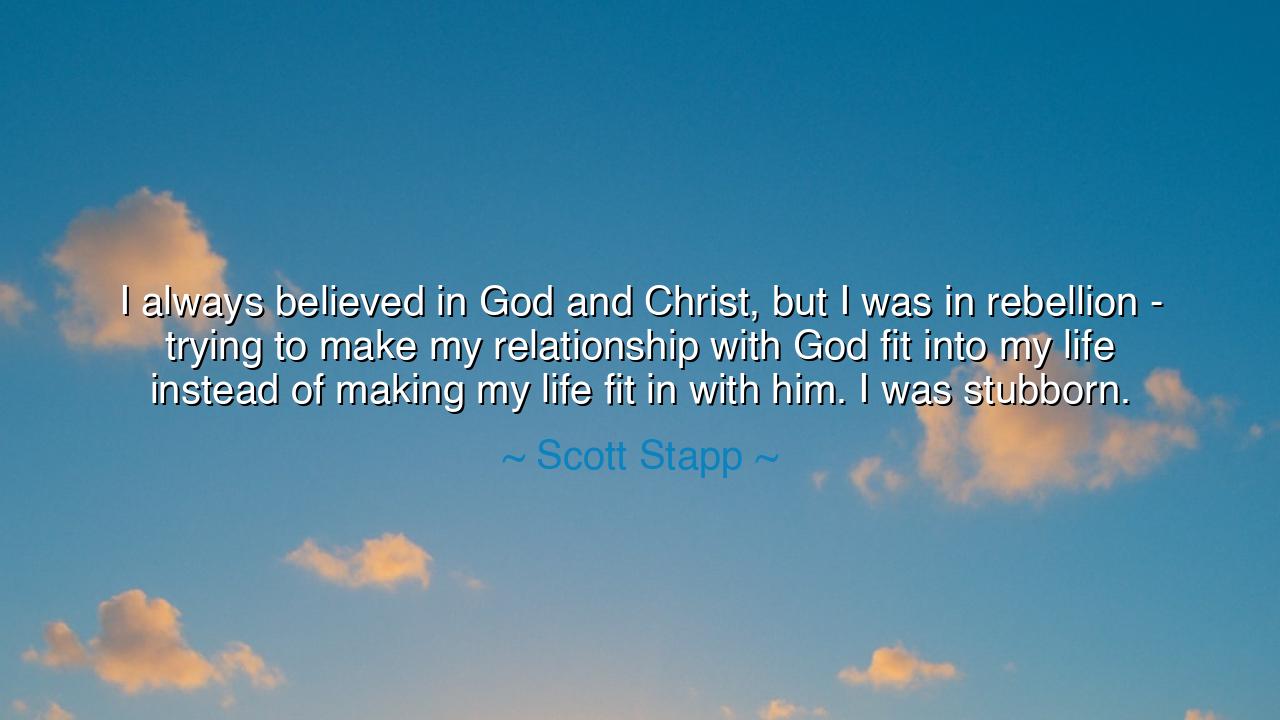
I always believed in God and Christ, but I was in rebellion -
I always believed in God and Christ, but I was in rebellion - trying to make my relationship with God fit into my life instead of making my life fit in with him. I was stubborn.






In the journey of the soul, there lies a struggle between desire and devotion, between the self and the sacred. Scott Stapp speaks to this inner conflict when he declares, “I always believed in God and Christ, but I was in rebellion — trying to make my relationship with God fit into my life instead of making my life fit in with Him. I was stubborn.” These words reveal the timeless tension of the human heart, which often seeks to bend the divine to its own will rather than surrender to its guidance.
To be in rebellion is to resist the natural order of the spirit, attempting to shape the eternal to the transient desires of the self. Stapp’s reflection teaches that faith is not a tool to be wielded at convenience, but a path to be followed with humility. The ancients knew well that the soul’s harmony arises not from bending the sacred to personal preference, but from aligning one’s life with divine principle, yielding to the wisdom that surpasses mortal understanding.
The act of trying to make one’s relationship with God fit into the rhythms of daily life is a form of stubbornness, yet it is a stage in the human journey. Stapp’s honesty illuminates the struggle inherent in spiritual growth: the tension between independence and surrender, between pride and humility. True wisdom arises when the self recognizes that the divine does not serve ambition, but that life gains meaning when it is lived in alignment with the sacred.
The origin of this insight is ancient, found in the teachings of prophets, sages, and mystics across time and culture. From the scrolls of the East to the parables of the West, humanity has been guided to see that the divine is not a mirror of personal will, but a compass for the heart. Stapp’s words echo this eternal truth: the transformation of the soul begins when one ceases to resist, embracing guidance rather than contorting it to convenience.
Thus, let this teaching endure: release the bonds of stubbornness, and let your life fit within the guidance of God and Christ. The path of surrender is not weakness, but strength; it is the cultivation of humility, purpose, and harmony. In yielding to the sacred, the heart finds peace, the spirit finds clarity, and the soul discovers its true place in the order of the eternal.






MLLe Mai Linh
I appreciate Scott Stapp’s honesty in admitting his stubbornness. It’s relatable because many of us try to hold onto control over our lives while still trying to follow faith. But this quote makes me wonder—what does it really look like when someone makes their life fit in with God? Is it a complete transformation, or is it more about a gradual shift in mindset and priorities?
PVPhung Vu
This quote makes me think about how often people view faith as something they can compartmentalize or manipulate to fit their lifestyle. It’s like treating God as a part-time aspect of life rather than allowing Him to guide every part of our existence. What do you think it takes for someone to truly surrender their life to God instead of just keeping faith as a secondary priority?
QDLuu Quang Dũng
Scott Stapp’s realization about rebellion and stubbornness speaks to a common human struggle with faith. I think it’s easy to want things to be on our own terms, but the question is: How do we truly submit to a higher power while still maintaining our individuality? Is surrendering to God’s will about giving up control, or is it about finding a balance that allows for personal growth?
DUNguyen ngoc diem uyen
It’s interesting how Scott Stapp reflects on his rebellion and stubbornness. Do you think that’s a common struggle for people when it comes to faith? Trying to live your life the way you want while still believing in God seems like a challenge. But, is it wrong to question or challenge God’s plan, or is that just part of the journey of growth in faith?
PQHao Nguyen Phuong Quang
This quote is really thought-provoking. The idea of rebellion against God by trying to make faith fit into your life instead of the other way around really hits home. But here’s a question: What does it mean to make your life fit with God? Does it require completely changing how you live, or can it be more about adjusting certain aspects of your life while keeping other parts intact?